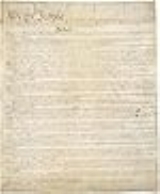
United States Constitution
The United States Constitution is the supreme law of the United States of America. It was completed on September 17, 1787, with its adoption by the Constitutional Convention in Philadelphia, PA, and was later ratified by special conventions in each state. It created a federal union of sovereign states, and a federal government to operate that union.
See also
- First Amendment to the United States Constitution
- Second Amendment to the United States Constitution
Quotes
- We the people of the United States, in order to form a more perfect Union, establish justice, insure domestic tranquility, provide for the common defense, promote the general welfare, and secure the blessings of liberty to ourselves and our posterity, do ordain and establish this Constitution for the United States of America.
- Preamble
- The President, Vice-President, and all civil officers of the United States, shall be removed from office on impeachment for, and conviction of, treason, bribery, or other high crimes and misdemeanors.
- Article II, sec. 4
- Treason against the United States, shall consist only in levying war against them, or in adhering to their enemies, giving them aid and comfort. No person shall be convicted of treason unless on the testimony of two witnesses to the same overt act, or on the confession in open court.
- Article III, sec. 3
- This Constitution, and the laws of the United States, which shall be made in pursuance thereof; and all treaties made, or which shall be made, under the authority of the United States, shall be Supreme Law of the land; and the judges in every State shall be bound thereby, any thing in the Constitution or laws of any State to the contrary notwithstanding.
- Article VI, sec. 2
The Bill of Rights
- Congress shall make no law respecting an establishment of religion, or prohibiting the free exercise thereof; or abridging the freedom of speech, or of the press; or the right of the people peaceably to assemble, and to petition the government for a redress of grievances.
- First Amendment (1791)
- A well-regulated militia, being necessary to the security of a free State, the right of the people to keep and bear arms, shall not be infringed.
- Second Amendment (1791)
- The right of the people to be secure... against unreasonable searches and seizures, shall not be violated, and no warrants shall issue, but upon probable cause.
- Fourth Amendment (1791)
- Nor shall any person be subject for the same offense to be twice put in jeopardy of life or limb; nor shall be compelled in any criminal case to be a witness against himself, nor be deprived of life, liberty, or property, without due process of law.
- Fifth Amendment (1791)
- In all criminal prosecutions, the accused shall enjoy the right to a speedy and public trial, by an impartial jury of the State and district wherein the crime shall have been committed, which district shall have been previously ascertained by law, and to be informed of the nature and cause of the accusation; to be confronted with the witnesses against him; to have compulsory process for obtaining witnesses in his favor, and to have the Assistance of Counsel for his defence.
- Sixth Amendment (1791)
- In Suits at common law, where the value in controversy shall exceed twenty dollars, the right of trial by jury shall be preserved, and no fact tried by a jury, shall be otherwise reexamined in any Court of the United States, than according to the rules of the common law.
- Seventh Amendment (1791)
- Excessive bail shall not be required, nor excessive fines imposed, nor cruel and unusual punishment inflicted.
- Eighth Amendment (1791)
- All persons born or naturalized in the United States, and subject to the jurisdiction thereof, are citizens of the United States and of the State wherein they reside. No State shall... abridge the privileges or immunities of citizens of the United States; nor shall any State deprive any person of life, liberty, or property, without due process of law; nor deny to any person within its jurisdiction the equal protection of the laws.
- Fourteenth Amendment, sec. 1 (1868)
- The right of the citizens of the United States to vote shall not be denied or abridged... on account of race, color, or previous condition of servitude.
- Fifteenth Amendment, sec. 1 (1870)
- The right of citizens of the United States to vote shall not be abridged... on account of sex.
- Nineteenth Amendment, sec. 1 (1920)
